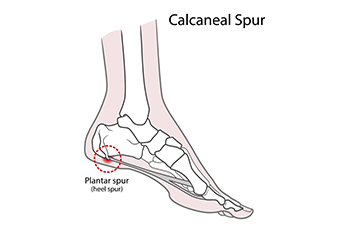
Heel spurs are bony growths that develop on the heel bone, with the two main types being plantar and dorsal heel spurs. Plantar heel spurs form on the bottom of the heel and are often associated with plantar fasciitis, causing pain and inflammation where the plantar fascia connects to the heel bone. Dorsal heel spurs develop at the back of the heel, typically where the Achilles tendon attaches, leading to discomfort and swelling in the area. Common symptoms of heel spurs include sharp pain while standing up in the morning, tenderness, and difficulty walking or running. Diagnosis usually involves a physical examination and imaging tests like X-rays to confirm the presence of the bony growths. Heel spurs can be painful. If you have developed one, it is suggested that you consult a podiatrist sooner rather than later who can offer you correct relief and treatment options.
Heel spurs can be incredibly painful and sometimes may make you unable to participate in physical activities. To get medical care for your heel spurs, contact Neeta Hasmukh, DPM from Total Podiatry. Our doctor will do everything possible to treat your condition.
Heels Spurs
Heel spurs are formed by calcium deposits on the back of the foot where the heel is. This can also be caused by small fragments of bone breaking off one section of the foot, attaching onto the back of the foot. Heel spurs can also be bone growth on the back of the foot and may grow in the direction of the arch of the foot.
Older individuals usually suffer from heel spurs and pain sometimes intensifies with age. One of the main condition's spurs are related to is plantar fasciitis.
Pain
The pain associated with spurs is often because of weight placed on the feet. When someone is walking, their entire weight is concentrated on the feet. Bone spurs then have the tendency to affect other bones and tissues around the foot. As the pain continues, the feet will become tender and sensitive over time.
Treatments
There are many ways to treat heel spurs. If one is suffering from heel spurs in conjunction with pain, there are several methods for healing. Medication, surgery, and herbal care are some options.
If you have any questions feel free to contact our offices located in San Antonio, Uvalde, and Jourdanton, TX . We offer the latest in diagnostic and treatment technology to meet your needs.
